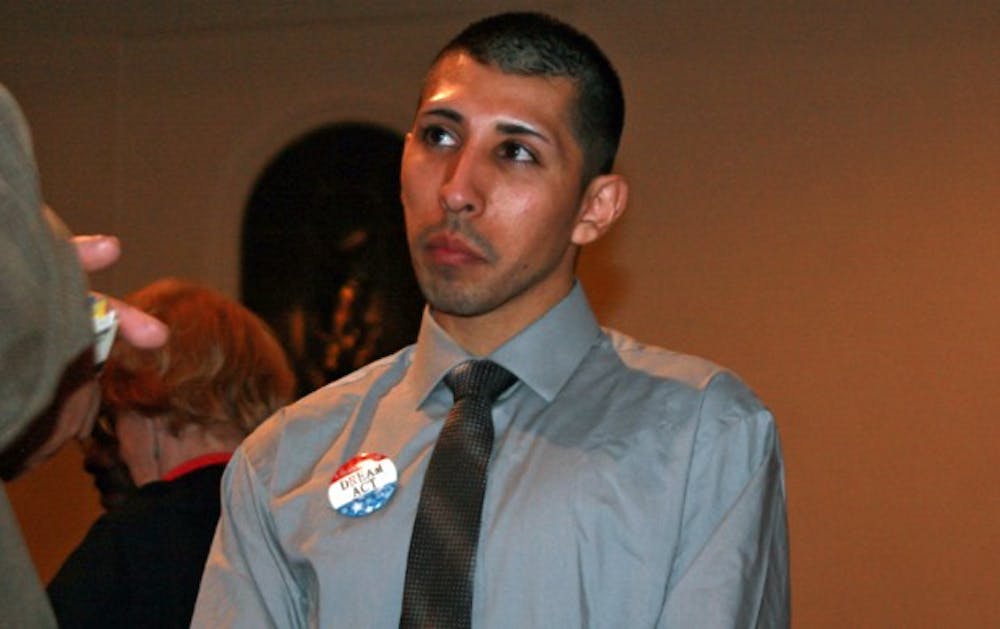Pedro Gutierrez walks up to a white podium wearing black slacks, a gray dress shirt and a black tie.
He is jittery as he starts speaking to about 60 members from the First Congregational United Church of Christ in downtown Phoenix.
A few weeks ago Gutierrez, a 22-year-old orphan, received a letter from the Department of Homeland Security explaining he would be deported on Jan. 18.
On a crisp Sunday night, the eve of Martin Luther King Jr. Day, Gutierrez shares his struggle with the congregation in hopes it might delay his deportation.
“I’m here trying to fight it. I may not be a citizen, but I love this country,” he says to the crowd. “I believe I am more of a citizen than anyone here.”
The multicultural crowd gives him a standing ovation.
Gutierrez is part of the 2.1 million undocumented youth estimated to live in America, according to the Migration Policy Institute, a non-partisan organization that examines migration policies. He is also part of the smaller pool of 114,000 undocumented youth in Arizona.
Gutierrez, short in stature, speaks with a deep, stern voice, yet struggles to express himself and trails off nervously, forgetting what he was going to say. He asks the congregation for empathy.
“Try to walk in my shoes,” he says. “[America] is all I know.”
Gutierrez was brought from Mexico by his biological grandmother when he was 7 years old. His life goal is to become a U.S. Marine, but because of his legal status he’s unable to join any military branch.
Before the vigil started he was outside the church sharing his story to reporters and supporters. He scrambles to find his words, with a nervous tick of licking the left-inside part of his cheek.
“I’ve never talked to reporters before, so I’m really nervous,” he says. “But I’m here to set an example and if I get deported maybe someone will pick up where I left off.”
Gutierrez’s story first got attention when the Arizona Dream Act Coalition, a group of mostly undocumented ASU college students, received a call earlier this month from Lewis Storey, Gutierrez’s former high school teacher. ADAC has been lobbying for years to get Congress to pass legislation that would grant a pathway to citizenship for undocumented youth who wish to continue their studies in higher education, or, in Gutierrez’s case, join the military.
“My grandpa was a Marine. He would talk about it all the time,” he says. “So ever since I was a kid it’s been my goal to join the Marines.”
Gutierrez’s life started to unravel in 2009 when he was pulled over for speeding in Casa Grande, Ariz., where he grew up. He was 17 at the time. The cop asked the routine questions — license and registration, please. But Gutierrez couldn’t prove his identity.
With no criminal history, Gutierrez was handcuffed for the first time and put in the backseat of a patrol car, not knowing what to expect.
“I felt helpless. I thought that was the end of me,” he says. “I thought I was going back to Mexico for sure.”
When Gutierrez's friends found out about his arrest they called Storey, his high school teacher, who assisted Gutierrez in getting legal representation. His original deportation date was set for Jan. 2012, but a judge ordered it cut down to 2011 because he doesn’t have immediate family in the U.S., Guitierrez says.
He doesn’t know his parents, nor has any solid memories of them. He thinks he’s from Puerto Peñasco, a city more commonly known as Rocky Point.
“They were alcohol abusers and drug abusers. That’s all I know,” he says.
Gutierrez found out he was undocumented after his grandmother died of a bad respiratory condition. A year later he became an orphan when his grandfather abandoned him.
“One day I was walking home from school, thinking everything was OK, and when I got home everything was a mess,” he says. “My birth certificate, my immunization records and even my grandmother’s ashes were gone.”
He asked neighbors what happened — no one knew. Hoping his grandfather would come back with an explanation, he decided not to call police. Guitierrez hasn’t heard from him since.
“I miss [my grandfather],” Gutierrez says. “If he’s listening I would want to talk to him, at least on the phone.”
Eventually a friend’s family took him in and he graduated from Case Verde High School.
On the day of his scheduled deportation, immigration officials gave him a 30-day extension. In that month, immigration officials will re-evaluate their decision in deporting Gutierrez, Storey says.
In the mean time, Gutierrez lives in limbo with the chance of still being deported.
At the end of the service, there is talk about Gutierrez and how courageous he is. Some people say that if Martin Luther King Jr. were alive today, he would be in full support of Gutierrez.
“Not a question in my mind,” says Rev. Jarrett Maupin. “If [Marting Luther King Jr.] were alive today he would go to jail with Pedro.”
Reach the reporter at uriel.garcia@asu.edu





